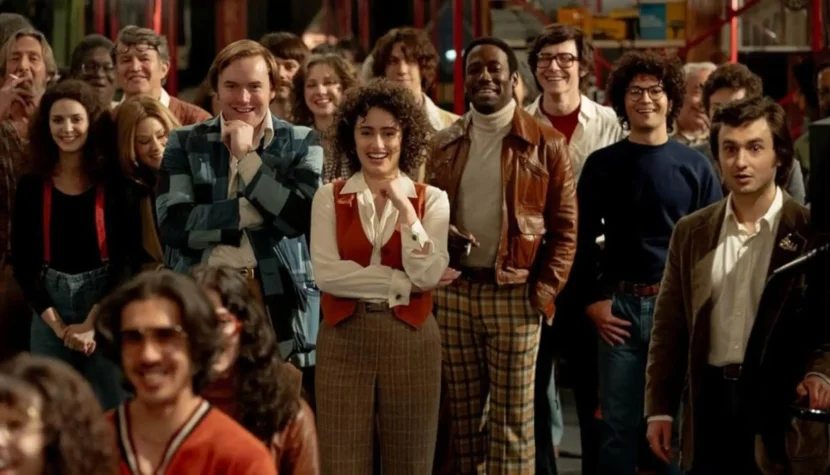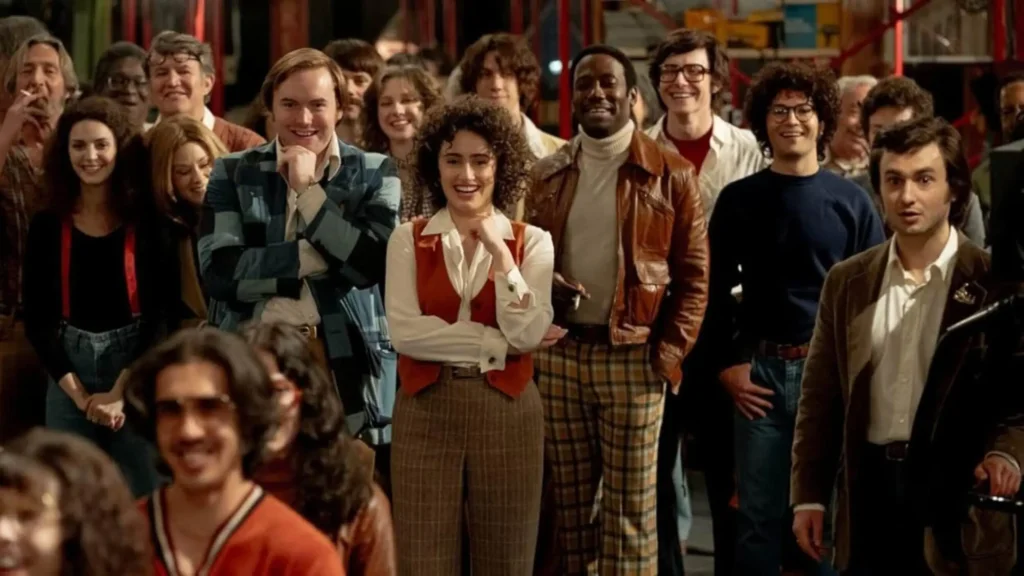SATURDAY NIGHT. Fever [REVIEW]

October 11, 1975, New York. A young page stands outside NBC headquarters, trying in vain to convince passersby to watch a new show that’s set to debut live on the network in less than two hours. Flaming pages fly out of the building windows—someone from the show’s team is making their opinion on the script clear. Inside, the scene is no better: writers, stars, and network execs are at each other’s throats, while the episode’s schedule is packed with ideas that need to be squeezed into 90 minutes of airtime. Jason Reitman’s latest film opens by sketching out the chaos behind the scenes of “Saturday Night Live”’s pilot episode; from there, the tension only builds.
Fortunately, the director is well aware of the material he’s dealing with. After all, “SNL” is an undisputed icon of American pop culture—a show that’s consistently pushed the boundaries of what can be shown on TV and has launched countless comedy careers (Bill Murray, John Belushi, Bill Hader, Tina Fey, to name a few). Given “SNL”‘s legacy, it would have been easy to turn “Saturday Night” into a reverent tribute to the show’s team. But “SNL”’s rebellious nature doesn’t quite lend itself to a glowing homage. Instead, Reitman took a different approach—he shot the entire film in the style of a sketch comedy.
The plot moves from gag to gag, with the countdown to “SNL”’s debut broadcast driving the rhythm of each on-screen joke. Following the show’s producer, Lorne Michaels (played by Gabriel LaBelle), we meet various characters entangled in the production machine. Much of the film’s charm lies in anticipating cameo appearances from “SNL” stars like John Belushi (Matt Wood), Chevy Chase (Cory Michael Smith), and Andy Kaufman (Nicholas Braun). While the portrayals often reduce the stars to the more extreme elements of their public personas (Chase as a smug jerk, Belushi as a volatile and constantly high performer, Jim Henson as a naive eccentric), together they form a likable band of underdogs facing down the rigid media establishment. “SNL” fans will enjoy spotting references and nods to the original show, but even those unfamiliar with it should find the film entertaining.

However, the film’s narrative structure brings one drawback: it’s somewhat uncritical in its view of the show’s stars. The more questionable traits of Chase or Belushi are softened here, shown more as amusing quirks. This impression is heightened by Reitman’s casting of NBC’s Machiavellian VP, Dave Tebet (Willem Dafoe), and the washed-up TV star Milton Berle (J.K. Simmons) as antagonists. As a result, the film’s most compelling character unexpectedly turns out to be “SNL”’s other co-creator, Dick Ebersol (played by Cooper Hoffman). Although his role is secondary, it makes sense within the story: he is the voice of reason among the team, the only one fully aware of the realities of show business, introducing a bit of nuance to the on-screen conflicts.
Maybe, though, I’m being too critical. Reitman doesn’t aim for a deep analysis of the “SNL” phenomenon, but he does capture the anarchic spirit of the show. He adeptly replicates the sketch format of the original without lapsing into mindless imitation. Above all, his film shows respect for the team that created “SNL” and a conviction that the show’s energy and humor speak for themselves. “Saturday Night” is perhaps the best possible tribute to this TV legend—just in time for “SNL”’s upcoming milestone anniversary.

